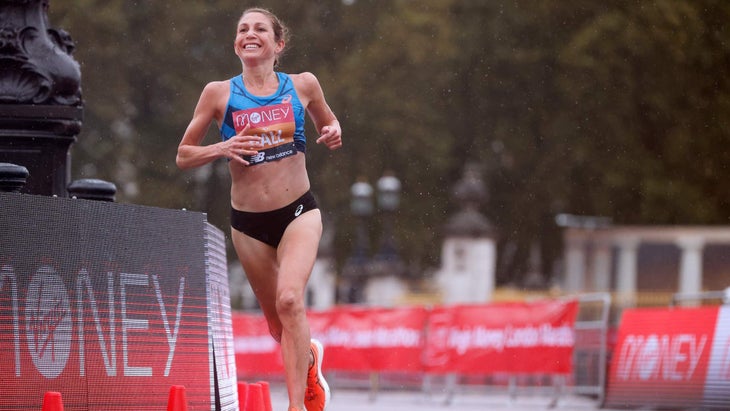Products You May Like
Get access to everything we publish when you
sign up for Outside+.
Want to run your first (or best) marathon in 2022? We reached out to four seriously talented U.S. marathoners—Sara Hall, Emma Bates, Laura Thweatt, and Sara Vaughn—to get their insights on what leads to success. Some of their key marathon training tips: Settle on a good training plan, train earnestly and consistently, and trust the process on your way to the starting line.
Why follow their advice? Hall is the second-fastest American woman marathoner with a 2:20:32 PR and has consistently been one of the top U.S. marathoners for the past several years, including consecutive podium finishes at the 2020 London Marathon (2nd), 2020 Marathon Project (1st), and 2021 Chicago Marathon (3rd). Bates had a breakthrough race with her second-place finish (2:24:40) in Chicago last fall after finishing seventh at the 2020 U.S. Olympic Trials Marathon. Thweatt (2:25:38 PR) was fifth at the 2020 U.S. Olympic Trials Marathon and eighth at last fall’s New York City Marathon (2:27:00); and longtime track specialist Vaughn won the California International Marathon in December with the fifth-fastest debut marathon time (2:26:53) in U.S. history.
8 Marathon Training Tips from the Pros
Keep these recommendations in mind as you build your plan and tackle the long training needed for a marathon.
1. Follow a Plan, Do the Work
Training for a marathon is a challenging journey and a long process. Most coaches recommend following a periodized training plan with a 16-week buildup that includes building an aerobic base of fitness, increasing a once-a-week long run, fine-tuning your training with faster, spicier workouts, and tapering about two weeks before the race. But implementing those elements on a weekly basis is like putting a puzzle together that requires the appropriate mix of training volume and intensity, as well as rest and recovery. Doing too much, too soon, or trying to run too hard too soon, can lead to fatigue, injuries, and overtraining.
RELATED: A 16-Week Marathon Training Plan to Go the Distance
You might (or might not) want to hire a coach or join a training group or you might want to follow a training plan on your own, depending on how much guidance or accountability you need or prefer. The key is understanding that training for a marathon is a long, nuanced process that requires patience, a calm approach, and a long-term perspective.
“Training for a marathon is such a process, and it needs to be, but I think sometimes people just get ahead of themselves and they can become overtrained or mentally overstimulated,” Bates says. “For me, it’s just about being patient in my training, being in touch with what I am doing every day, and not getting ahead of myself.”
RELATED: Become a Better Runner in 2022 with This Complete Training Guide
Start by writing down your goals, signing up for a race, and knowing you have a lot of work to do to achieve those goals. Even if you start from a low fitness point, staying committed—to your goals and the hard work—is the only thing that will get you there.
“I always write down my goals so I can come back to that later in the season when I am feeling unmotivated or bored with what I’m doing,” Thweatt says. “The first part of your training program is so important, and you have to put in the work so when it gets more exciting and you start approaching your race day, you have that base to build upon and draw confidence from.”
2. Train as Consistently as Possible

Consistency is the biggest thing that will help you reach your marathon goals. Following a plan is crucial, but balancing the challenges of life and how your body manages the training is crucial too. Because life—work, family, kids, friends—gets in the way: Inclement weather can impact your weekly training, fatigue and injuries need to be managed, sometimes workouts are missed, your training week needs to be changed, long runs need to be shortened, or more rest might be required. There is no such thing as a perfect training buildup.
Do your best to plan out your coming week of training every Sunday night; it can help you understand where and when your running fits into your life schedule. The other elements of your life are equally (or more) important, but knowing when you’ll be able to get your daily run in will help you train consistently, reduce daily stress connected to it, and lessen the likelihood of skipping or shortening workouts.
“Routine is a huge part of training for me,” says Vaughn, who, like Hall, is a mother of four kids. “I can’t really do what I do and train consistently when there’s a lot of unpredictable things happening or I don’t know when I’ll be able to get my running in. There’s a lot to manage with family and work, so having a routine or a setting your schedule for the week ahead can really help you remain as consistent as possible.”
RELATED: You Really Don’t Have to Follow Your Workout Plan So Literally
3. Share Your Journey
As much as training for a marathon is a singular goal and an individual process, it will go much better for you if you engage with others, Hall says. That might include your family or significant other so you can develop a shared sense of purpose and joy, but it can also mean immersing in the process with training partners with similar goals—or even sharing your journey with non-running friends who are interested and inspired by what you’re doing. Tackling your long runs and harder speed workouts with running buddies or a running group can be similar to taking a spoonful of sugar to help the medicine go down. Sharing your journey with a bestie who lives far away will help them appreciate your endeavor and spark inspiration in their world.
“My best advice is to engage people as much as you can,” Hall says. “You’re out there for a lot of long miles, maybe hot summer miles or cold winter miles, and sometimes it helps to have the accountability of people and people that can bring joy to the process. It’s really powerful to be able to share the journey with people, regardless of how it goes on a day-to-day basis. Having others along with you, it can help you enjoy the process so much more.”
RELATED: Like Daughter, Like Mother: How Sara Hall Helped Her Mom Run Her First Half-Marathon
4. Do The Extra Stuff—Within Reason

Becoming a better marathoner is largely about training yourself to run better, but it’s so much more than that. It’s also about being the best version of you in every way imaginable. Your journey to a marathon starting line is also a good time to improve your eating habits, manage your daily and weekly life schedule, optimize your sleep, and become a better overall athlete by doing strength work, running drills, and cross-training. You’ll likely be inspired to do a lot of those things, but it’s important to realize that you shouldn’t force yourself to do everything or focus on being perfect.
“Do whatever you can on a consistent basis, but you have to realize you can only do what you can do,” Thweatt says. “I have always tried to do yoga, but I just can’t quite figure that out. But for me, I’ve really come to understand the benefits of doing strength work and getting into the gym a couple of times every week. That’s a huge piece of how I’ve stayed healthy and strong so I can down the miles and lay a foundation for the entire season.”
RELATED: This 8-Week Strength Program Is Designed To Help You Run Injury-Free
For Hall, it’s all about having proper perspective and a healthy balance that straddles the need to be self-focused and the desire to be selflessly humble.
“I try to do as much as I can as consistently as I can on a sustainable basis, but the more important thing is loving the people in my life,” Hall says. “I know looking back on my life I am not going to regret spending more time with them, I’ll regret spending more time training. I think the relationships are the best part of the sport and the best part of life, and I think you can become tunnel focused and endlessly pursue that 1 percent, you know? That can be good, but my whole day doesn’t revolve around running, and I think that’s healthy, too.”
5. Just Keep Showing Up
Training for a marathon can be fun, but it will also be difficult. Early on during your journey, your body will be fatigued as you ramp up your training volume. At times, strength training and speed work will make you sore and achy. There are days you’ll feel fast and fit and days you’ll feel sluggish and slow.
As 2018 Boston Marathon champ and two-time Olympian Des Linden has famously said, just keep showing up and doing the work can be a big catalyst to success. Completing whatever is on your training plan for a given day doesn’t need overthinking or added stress. It doesn’t need to be pretty or smooth. Just put in the work and know that tomorrow is another day. Trust your training without second-guessing yourself (or your coach) and without stressing about what you did yesterday or your race date that’s several weeks away.
“You don’t have to feel perfect or amazing for every workout,” Vaughn says. “Half of the workouts I did, I thought, ‘I don’t know if I was any good or not.’ But you’re still stacking up fitness and stacking the bricks and making the steps you need to get to the marathon. I think it ultimately taught me patience, if I had to narrow it down to one word.”
6. Recover, Rest, Repeat
This marathon training tip is easier said than done, but getting to the starting line of your race rested and healthy is part of a successful marathon. As much as your long runs and harder workout sessions are building your fitness, a full training transformation can only happen with proper recovery time. Insufficient rest days or sleep can lead to greater fatigue, a negative mental outlook, and a path to injury.
Training for a marathon is all about pushing your body as much as you can handle without really knowing where that cut-off line is, Bates says. During your buildup, you will need to fight the urge to do more to ensure you are well rested and also make sacrifices in other areas of your life to maximize your sleep. Temporarily giving up evenings out, a second glass of wine, or late-night movies on Netflix in favor of more sleep can pay off immensely.
“Getting to the starting line healthy is so important, but getting to the starting line 90 percent trained and feeling fresh is better than arriving overcooked,” Vaughn says. “With my fall marathon buildup, we did what we needed to do every day, made sure I got my rest, built in proper down weeks, tapered when we needed to, and got to the starting line healthy. It wasn’t rocket science, but it worked.”
RELATED: Rest Days are Key to Staying Healthy
7. Focus on Incremental Gains

Your marathon training journey is an individual process that will ebb and flow according to how your body responds and how your training fits into the rest of your life. Along those lines, you need to understand that no specific day of your 16-week marathon buildup will make a huge difference or impact in your overall training. And as much as you’re training for a specific marathon at a specific date in the near future, the training process you’re going through will have long-term impacts that can benefit you on the way to your next marathon. The key is to continually make incremental gains that will benefit you on your current training path, your life in general, and whatever your future holds, Hall says.
“That’s one of the things I benefit from, trying to get a little bit stronger and a little bit faster over some key workouts in each buildup and not trying to ramp things up really fast,” Hall says. “Just celebrate small improvements, even if those don’t manifest in the marathon on race day, knowing that those are going to come to fruition in your next training buildup. I truly believe that the ceiling of your last buildup is like the floor of your next buildup, and it’s always building upon itself.”
RELATED: Beyond the Physical: Running Leads to Mental Health Transformations, Too
8. Race with Calm and Focused Presence

The toughest thing about the marathon is that the earnestness and consistency of your training journey may or may not come to fruition on race day. But the best chance you have to harness your training and advanced fitness is to have a strategic plan on how to run your race. That might be a conservative approach that gets you to the finish line, or it might include purposely taking risks in the second half of your race to reach a specific time goal.
Do your best to remain present, calm, and focused in the days before the race until you reach the starting line. Understanding your race strategy—as well as a sensible plan B in case you don’t feel your best or weather impacts your race—is the key to finishing with measurable success. Just as your training buildup is a journey, so is the 26.2-mile run to the finish line. Run with control and confidence knowing how hard you worked to get there and allow your well-honed fitness and determination carry you to the finish line.
“It’s really hard, just because you feel so good and everybody feels good around you and has all of this pent-up energy,” Bates says. “There’s so much excitement early in a race, especially from the people cheering on the side of the road. You can really lose a marathon in the first 8 miles or so, so you really have to hold back. It’s really hard to be controlled because of all of the energy from the environment you’re in. You have to remain calm and present and focus on what you came there to do and then go about doing it the way you planned to do it.”
RELATED: Boston is Back, and Everybody is Running It: Americans Include Molly Seidel and Des Linden
